|
Dusty Dog Reviews The whole project is hip, anti-academic, the poetry of reluctant grown-ups, picking noses in church. An enjoyable romp! Though also serious. |
|
Nick DiSpoldo, Small Press Review (on Children, Churches and Daddies, April 1997) Children, Churches and Daddies is eclectic, alive and is as contemporary as tomorrow’s news. |



|
Kenneth DiMaggio (on cc&d, April 2011) CC&D continues to have an edge with intelligence. It seems like a lot of poetry and small press publications are getting more conservative or just playing it too academically safe. Once in awhile I come across a self-advertized journal on the edge, but the problem is that some of the work just tries to shock you for the hell of it, and only ends up embarrassing you the reader. CC&D has a nice balance; [the] publication takes risks, but can thankfully take them without the juvenile attempt to shock. |
|
from Mike Brennan 12/07/11 I think you are one of the leaders in the indie presses right now and congrats on your dark greatness. |
Volume 239, December 2012
Internet ISSN 1555-1555, print ISSN 1068-5154
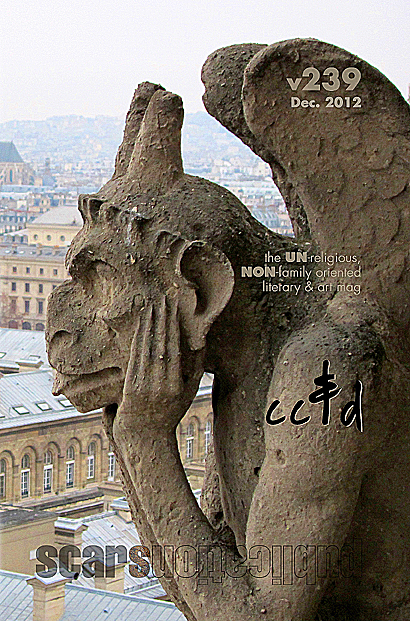
Cover art by Eric Bonholtzer
see what’s in this issue...
Note that in the print edition of cc&d magazine, all artwork within the pages of the book appear in black and white.
|
Order this issue from our printer as a a paperback book (5.5" x 8.5") perfect-bound w/ b&w pages |

poetry
the passionate stuff
Nailed Flailed and Bailed
Bruce Matteson |
The Wise MommyJoseph Hart
Mommy, you were absolutely right.
|
|
Janet Kuypers reads the Joseph Hart December 2012 (v239) cc&d magazine poem the Wise Mommy |

See YouTube video of Janet Kuypers reading this poem straight from the December 2012 issue (v111) of cc&d magazine, live 12/5/12 at Gallery Cabaret’s the Café Gallery open mic in Chicago) |
VengerovJoseph Hart
How do the other violinists
|

Letter to Santa Claus Jeffrey Park
My letter to Santa, scrawled with mechanical precision
Dear Santa,
Now just another one of those rusted memories
|
Jeffrey Park BioBaltimore native Jeffrey Park currently lives in Munich, Germany, where he works at a private secondary school and teaches business English to adults. His latest poems appear or are forthcoming in Subliminal Interiors, Mobius, Punk Soul Poet, Darkling Magazine, The Camel Saloon and elsewhere.
|
On the Sounds of a Bus RideMichael Ceraolo
The computerized voice announcing the stops
|
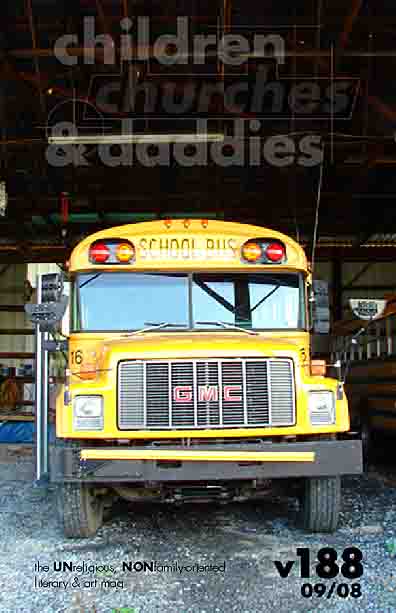
X BuildingHarlan Richards
It’s a barracks.
|
Spare PartsCara Chanoine
My body
I spend most of my time parked,
Let the crash that totals me
|
Brooklyn: Invisible ManMel Waldman
Like a rat in a maze, an unwilling subject in a sinister experiment,
What’s my sin? Old and obsolete, someone pressed the delete key
No one can see me now. How did this happen? Even Kafka was kinder,
What will I do? I can’t find the exit. I’m Brooklyn’s invisible man.
Beware! Invisibility will swallow your faces too, leaving no traces of
I’m the disheveled old man you can’t see. I’ve got a long gray beard
I’ve got enough except for food, water, and shelter. Homeless and invisible,
What’s my sin? Does anyone out there know? Goodbye. Why?
|
BIOMel Waldman, Ph. D.Dr. Mel Waldman is a licensed New York State psychologist and a candidate in Psychoanalysis at the Center for Modern Psychoanalytic Studies (CMPS). He is also a poet, writer, artist, and singer/songwriter. After 9/11, he wrote 4 songs, including “Our Song,” which addresses the tragedy. His stories have appeared in numerous literary reviews and commercial magazines including HAPPY, SWEET ANNIE PRESS, CHILDREN, CHURCHES AND DADDIES and DOWN IN THE DIRT (SCARS PUBLICATIONS), NEW THOUGHT JOURNAL, THE BROOKLYN LITERARY REVIEW, HARDBOILED, HARDBOILED DETECTIVE, DETECTIVE STORY MAGAZINE, ESPIONAGE, and THE SAINT. He is a past winner of the literary GRADIVA AWARD in Psychoanalysis and was nominated for a PUSHCART PRIZE in literature. Periodically, he has given poetry and prose readings and has appeared on national T.V. and cable T.V. He is a member of Mystery Writers of America, Private Eye Writers of America, American Mensa, Ltd., and the American Psychological Association. He is currently working on a mystery novel inspired by Freud’s case studies. Who Killed the Heartbreak Kid?, a mystery novel, was published by iUniverse in February 2006. It can be purchased at www.iuniverse.com/bookstore/, www.bn.com, at /www.amazon.com, and other online bookstores or through local bookstores. Recently, some of his poems have appeared online in THE JERUSALEM POST. Dark Soul of the Millennium, a collection of plays and poetry, was published by World Audience, Inc. in January 2007. It can be purchased at www.worldaudience.org, www.bn.com, at /www.amazon.com, and other online bookstores or through local bookstores. A 7-volume short story collection was published by World Audience, Inc. in June 2007 and can also be purchased online at the above-mentioned sites. |
Not Unlike TodayBradley Bates
A lady stands to receive her award,
|
What Blesses Us and Give us PleasureMichael S. Morris
Inspiration, that shooting star burning
Initiation, into the black arts turning
Declarations, seem to frame themselves
Consecration, and gives us pleasure by
|
Attention Madison Avenue, Time to Shave Another CustomerWilliam Robison
In the 1920s flocks of flappers
Milky, silky, smooth flesh is beautiful
Contemplating the wide wiry whiskers
Viewer, are you embarrassed by the
Don’t dull the edge of your sewing scissors!
How much would you pay? Well, don’t answer yet!
And, folks, it’s only $19.95!
Plus, make your purchase with a credit card
But don’t delay! Limited time offer!
|
William Robison BioWilliam Robison teaches history at Southeastern Louisiana University and has published considerable nonfiction on early modern England, his most recent work being The Tudors in Film and Television (McFarland, 2012), co-authored with Sue Parrill. For more info, see http://www.tudorsonfilm.com. He is also a musician and a maker of short films, both which the curious can check out at http://www.myspace.com/562067730. Poetry is a newer form of expression for Robison, but recently hwe has had poems accepted by Amethyst Arsenic, amphibi.us, Anemone Sidecar, Apollo’s Lyre, Asinine Poetry, Carcinogenic Poetry, decomP magazinE, Forge, Mayday Magazine, On Spec, and Paddlefish.
|
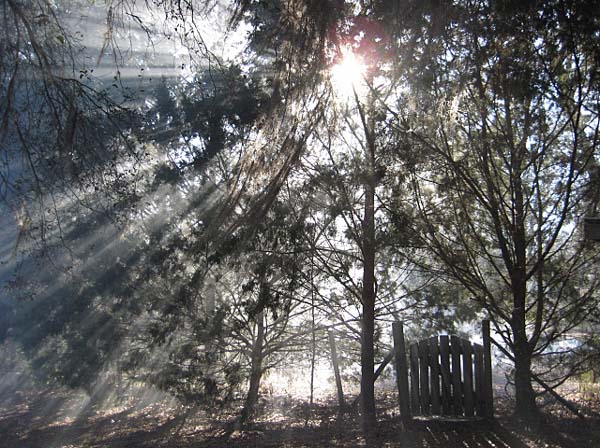
Portal, art by Rose E. Grier
Poem from The Metaphysical
Kenneth DiMaggio |
Love’s Take on MulticulturalismCopyright R. N. Taber 2012
As I put my lips to yours,
As the flame goes to work
Sadly, we must rise and leave
Find us among arts and streets,
|
Apparently, DavidMichael Lee Johnson
There are categories of hell here.
Fact, I was a newspaper reporter.
David’s drinking became his sin.
His widow was a chronic bitch.
His wife of 14 years She was simply a mindless fragment. Her life was understated, full of fragments.
She got drunk on the night David died.
Either way, Cherry Lee helped There were no memorial services.
David’s ashes are still in a fruit box;
No urn, present or past tense.
Only a label, a tag on the cinerary stating: There are no survivors here.
|
| *Special note. This poem evolved from an email dialogue with Kim Fregia about David, her friend, before his untimely death. I’ve tried but haven’t been able to touch base with her since. Her original poem with my editing can be found at Itasca Illinois: Poetry & Willow Tree Dreams: http://itascaillinoispoetryman.moonfruit.com/#/poet4/4565348131. |
Literary SilenceBrian Looney
Quotations
have a way of grating.
|
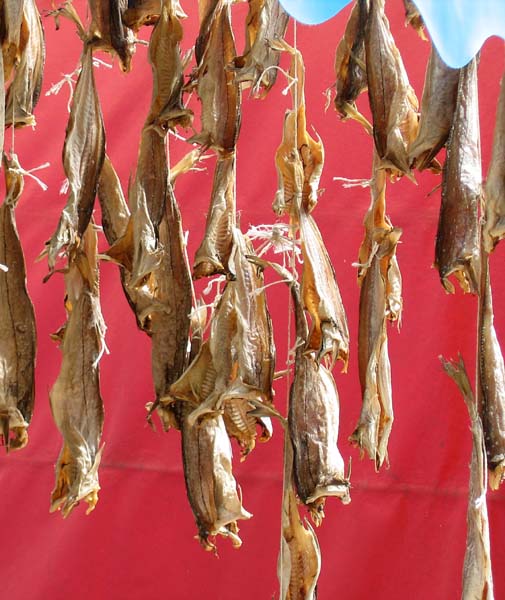
Swim, art by Oz Hardwick
A Worm’s Eye View of the Battlefield
I.B. Rad |
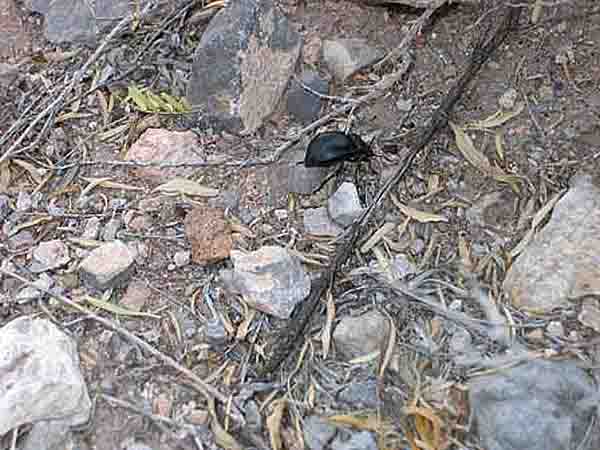
Beetle, photography by Brian Hosey and Lauren Braden
Fleecing the LambCK Baker
The bankers are in a bind
The emperor has
Decency in abeyance
The finger test
Heads of state
Intuitive tools
The goats of show
Looks like the drafts
The inquisition
|
BreadcrumbsStaci Leigh
So empty
|
|
Janet Kuypers reads the Stacy Leigh December 2012 (v239) cc&d magazine poem Breadcrumbs |

See YouTube video of Janet Kuypers reading this poem straight from the December 2012 issue (v111) of cc&d magazine, live 12/5/12 at Gallery Cabaret’s the Café Gallery open mic in Chicago) |

art by Eric Bonholtzer
DragonfliesAndrew H. Oerke
So there still are dragons and I’m glad there’s an airforce chock-
But back to my boyhood’s fishing pole line and a dragon-lace
|
Missed the Clicks and ScratchesJanet Kuypers5/15/12
(not knowing that downstairs
you suggested playing music.
I had to trudge upstairs and
to find an old record player in dust.
So after a rag for cleaning
we eventually sat on the floor listen.
And playing the records sounded...
I hear a fullness I haven’t heard
or walkman headphones.
making everything smaller,
when we shrink everything down lives.
And simply put, I missed
I missed the imperfections.
we’ve done everything we could
is generically the same,
I’ve missed the scratches
the hiccups and skips
It’s been a while since I’ve
it’s been a while since i’ve
At least we found this record
of what I was missing
now forced into our
|

Watch the YouTube video of Kuypers reading this poem at the open mike 5/9/12 at Gallery Cabaret’s the Café Gallery in Chicago (W/ by live piano music from Gary) from the Sony video camera |

Watch the YouTube video of Kuypers reading this poem at the open mike 5/9/12 at Gallery Cabaret’s the Café Gallery in Chicago (W/ by live piano music from Gary) from the Canon video camera |

Watch the YouTube video of Kuypers’ open mike 5/9/12 at Gallery Cabaret’s the Café Gallery in Chicago where she reads this poem, plus her poetry (w/ live piano from Gary) from the Sony video camera |
Us Creative TypesJanet Kuypers5/17/12 I’m angry with you.
I know us creative types
but only if you’re so destitute
I mean, I know
If you think this will
Is that how you ###
Because screw you, Trust me, I know.
But all us creative types So yeah, I’m angry with you.
Because you said
Test your brain and your soul
And I’m angry,
And I’m angry,
And I’m angry,
|

Lunge, art by Peter LaBerge
Inches Above the GroundJanet Kuypersa twitter-length poem 5/18/12
My feet are in so much pain
But if that happened,
|
Over Their CoffinsJanet Kuypers5/18/12
I work for
Yes, photos taken
|
Kill the Vermin
Janet Kuypers |
| Janet Kuypers reads her poem Kill the Vermin with live piano music by Gary |

Watch the YouTube video of Kuypers reading this poem at the open mike 6/9/12 at Gallery Cabaret’s the Café Gallery in Chicago (W/ by live piano music from Gary) Sony |

Watch the YouTube video of Kuypers reading this poem at the open mike 6/9/12 at Gallery Cabaret’s the Café Gallery in Chicago (W/ by live piano music from Gary) Canon |

Watch the YouTube video of Kuypers’ open mike 6/9/12 at Gallery Cabaret’s the Café Gallery in Chicago, plus her poetry (w/ live piano from Gary) |

prose
the meat and potatoes stuff
A Christmas StoryJon Wesick
No matter the time of day, the boardroom of Specter Toys, a division of Specter Missile and Defense Systems, remained cloaked in shadows. The chief executive officer sat behind a desk on raised steel flooring and stroked his cat’s long white fur. Both had a predator’s pale blue eyes that pierced their victims’ bowels with icicles of fear. A livid purple scar ran from the CEO’s left eye socket to the top of his shaved skull. Perhaps the way he pinched his black cigarettes between thumb and index finger gave his subordinates some clue of his origin, but they referred to him only as Number Two.
|
About Jon WesickJon Wesick hosts San Diego’s Gelato Poetry Series and and is an editor of the San Diego Poetry Annual. He has published over two hundred poems in journals such as The New Orphic Review, Pearl, Pudding, and Slipstream. He has also published over forty short stories in journals such as CC&D, Space and Time, Zahir, and Tales of the Talisman. Jon Wesick has a Ph.D. in physics and is a longtime student of Buddhism and the martial arts. One of his poems won second place in the 2007 African American Writers and Artists contest. Another had a link on the Car Talk website.
|
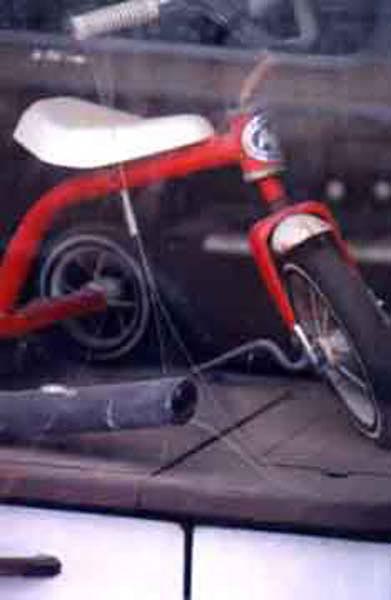
Unridden, art by Cheryl Townsend
Fred, some of your writing is too disgusting.Fritz Hamilton
“Fred, some of your writing is too disgusting. Most people don’t want to read about beheadings with blood gushing like Old Faithful from your neck in a world where nobody’s faithful, & love is many a splendoured gore.”
|
The Neck StretchesFritz Hamilton
The suicide who hanged himself has stretched his neck 20 ft & lies upon the kitchen floor. His wife awakes in the morning to discover him & urps over his flabby belly. She takes the dish towel & wipes him off, then replaces the towel on its rack adding to the aura of disgust. She decides not to eat breakfast at home & goes out to Mary’s diner down the street. Tasting nothing, she washes the vomit out of her mouth with coffee & wipes the front of her t-shirt with her napkin. She smiles at the waitress across the counter. The waitress pretends she’s not there. She pays, tipping gener- ously, & walks home. The sun rises over what’s becoming a beautiful day.
|
InvincibleMichael Trainor
Stomach acid like old orange juice. This is the part I hate: when there’s nothing left inside your stomach to spew, so puddle after putrid puddle of enzymes and bile come heaving out of your stomach instead of food. Six days sick and I’m praying to God and the devil – promising my soul to the first one who can cure this sick, nauseous feeling inside my gut or bring on the sweet, welcome relief of unconsciousness or death.
|
Remember?Eric Burbridge
What’s with the attitude? The car stopped at six this morning; it coasted down the ramp or it wouldn’t be in the middle of the driveway. I rented it in Chicago; the name is Gaines, Bernard Gaines.”
He heard the security lock release when he pulled the door open. He ran into a cloud of cigar smoke from a previous customer. He coughed and fanned the pungent cloud when he approached the window. A senior citizen who looked like he was out of a Norman Rockwell painting sat behind bullet-proof glass. He adjusted his cap and gave him a half smile.
Bernie walked through the double glass doors, down a hallway that passed through a lounge area with cocktail bars on each side. The smell of smoke and whiskey lingered in the air. A barmaid with a round freckled face smiled and filled his glass from the tap. He savored that first sip. At least it was right. He looked around at the rows of pool tables, pinball machines and video games. He counted sixteen bowling lanes. Each packed with league bowlers in colorful shirts with beer bellies that rolled with each hearty chuckle. Cheers and boos were typical reactions to the sounds of crashing pins.
Bernie stirred his drink and watched the slice of lime bump into the ice cubes, than he downed it. “You know Peggie, I stopped using the B-word years ago, but she deserves the name. I’m not...I wasn’t drunk. She’s being a bitch for the hell of it. Talkin’ down to me like I’m a kid. So, I might as well get drunk.” She grabbed his hand and rubbed it not knowing what to say. She feels right; I don’t want to blow it by looking too helpless. “Well, at least I got you.”
Bernie stepped in the currency exchange and an elderly lady with a pleasant southern mannerism offered him an oatmeal cookie and slid it through the slot with his documents. He walked down the drive to the rental agency and smiled at the clean vehicle in front. Clare stood at the desk with a blank expression.
|
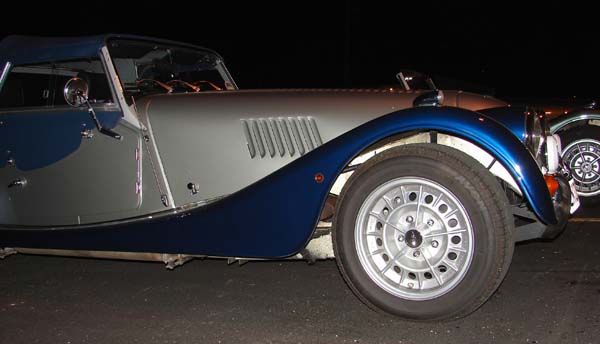
The LotKelly Darrow
The Lot was a nice piece of level land surrounded by twenty or so feet of woods. The thickness of the trees isolated it from the street, which served as a great wind barrier. It was about half the size of a football field with thick green grass. It was a great place for kids to play and hangout in. He would clumsily stand on his feet and look down to see the outline of his body disappear in the grass as it popped back up towards the setting sun. These were very special times for Johnny that even thinking of them now as an adult gives him a feeling of peace.
The lot had taken on many identities during Johnny’s tenure in the neighborhood. By the time he was sixteen it was the place to sneak beer into and drink and hang out with his buddies. They were good kids, they just went through what most kids do, which was experimenting with trouble. They would drink baby Budweiser’s and listen to music and talk about girls and what they wanted to do in life. They talked about how tough they were when they all knew they weren’t that tough at all. They bragged about the girls that they hadn’t been with convincing each other that they actually had been. It was mostly a good time with innocent fun. There were the negative aspects of the lot as well. When kids at school had differences, the lot at dark was the place to go settle it. Many fist fights settled various disagreements in the lot. Johnny knew this first hand having had his nose busted several times.
On Johnny’s seventeenth birthday he took a girl to the lot to have sex for the first time. He thought he was a real man. It was with his girlfriend of three months. He had no clue what he was doing and neither did she. He was so nervous when he took off his clothes that he couldn’t stop shivering and she was so nervous she couldn’t stop talking. They thought they were so grown up, but they were young kids moving much too fast. It was a horrible experience for them both. It was in the front seat of his truck on a warm summer evening with a girl named Wendy. His parents had never taught him anything about sex. He had never even recalled hearing them say the word. He learned everything he knew, which wasn’t much, from his friends at school, of course in all actuality he knew far from enough. At least he was smart enough to go to the Road Runner and buy a condom from the restroom vending machine and had enough responsibility to actually use it. Of course being a boy, the first thing Johnny did that Monday at school was to brag about how good she was and how good she said he was. He learned a hard lesson during this point in his life. He learned never to brag; because once it gets around school, the girl is looked down upon while the boy is a hero. For a few weeks he was the hero, which he despised. It made him feel so bad because his hero status meant slut status for Wendy. She was a good friend until they had sex, now she hated him and he was too embarrassed to face her so they stopped talking to each other. Eventually his friends followed suit and took girls to the lot and of course they bragged about it even though Johnny urged them not to.
|

Landscape, art by the HA!man of South Africa

Street, art byDavid Michael Jackson
The Ouija BoardJohn Ragusa
Bugsy and Popeye entered a house where they would stay until the police stopped looking for them. Bugsy held a bag full of cash. Popeye had a gun in his hand. They both had nylon stockings over their heads; they removed them. Then they plopped down on a sofa.
|
Desperation WindChris Allen
“Get up you bastard,” said a deep and gruff voice.
|
Chris Allen bio (2012)Chris Allen is 21 years old and started writing short stories at the age of eighteen. None of his short stories have been published yet, but has had some interesting work in printed journalism and even his own radio show where he guest starred, “friend of aliens,” Riley Martin from the Howard Stern Show.
|
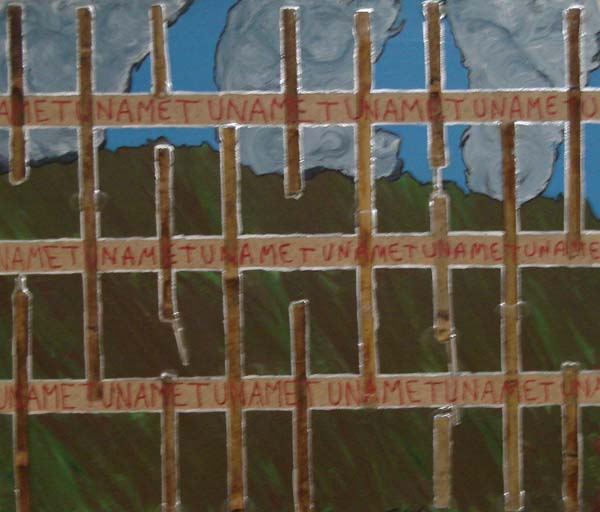
If You Leave Us in This Shark Cage, art by Aaron Wilder
The Ultimate Wannabe CowboyJohn Duncklee
Dusty Traylor, loaded down with two Peacemakers and a Spencer rifle, plus two pockets of his buffalo hide chaps filled with ammunition, ran as fast as his stubby legs could support his corpulent body at the speed he strived for to escape the wrath of the five men that chased him down the road next to the International border between El Paso and Juarez. Blood gushed from his nose and mouth from the over exertion. He reached up and wiped at the blood with the sleeve of his buckskin shirt and continued his run for the safety of Texas. He looked ahead and was overjoyed at seeing the entry to El Paso a hundred yards away. That hundred yards seemed to Dusty like a hundred miles, but he kept running. At least he thought he was running, but his legs had rebelled and he was walking and didn’t realize it. With one glance back he saw that his pursuers had closed the distance between them to fifty yards. Quickly, he turned back his head to the goal and with all the strength he could muster, walked as fast as he could.
|
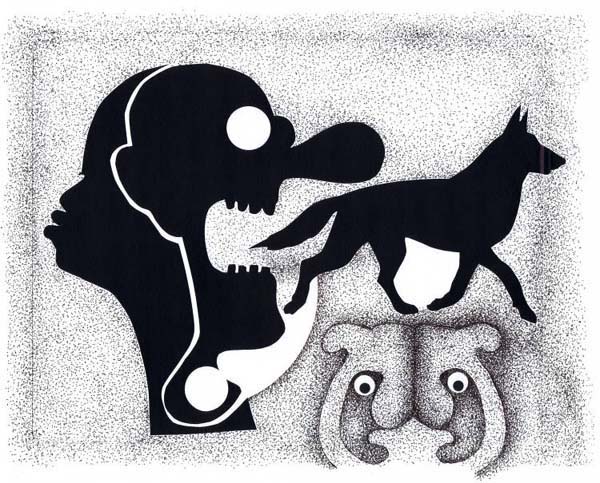
CCI18122010 HOK, art by Üzeyir Lokman ÇAYCI
Full MoonBob Strother
Hamilton County Police Sergeant Deke Spires slouched comfortably in the back row of metal chairs, looking out over a couple of dozen seated patrol officers working the department’s second shift. It was the Wednesday before Thanksgiving, and just over a week to his long-awaited retirement.
The afternoon was uneventful—a few routine traffic stops, a half-hearted domestic dispute that fizzled quickly, and one truck reported stolen from a used car lot. Spires and Garrett got tacos and Pepsis around six o’clock, and ate at a concrete table on the restaurant patio. It was already dark and the air was becoming colder. When they were finished they disposed of their trash, got back into their patrol unit, and checked in with dispatch.
After Spires and his partner drove away, Garrett asked, “You think Twelve-B-Ten has a shot at that pizza?”
Spires followed the ambulance to the hospital, got a report from the attending physician, and then headed back to the police station. On the way, he called the News 4 offices, and then stopped off there briefly. At the station he found Sergeant Crisp in his office, and slumped down into one of the visitor’s chairs.
|
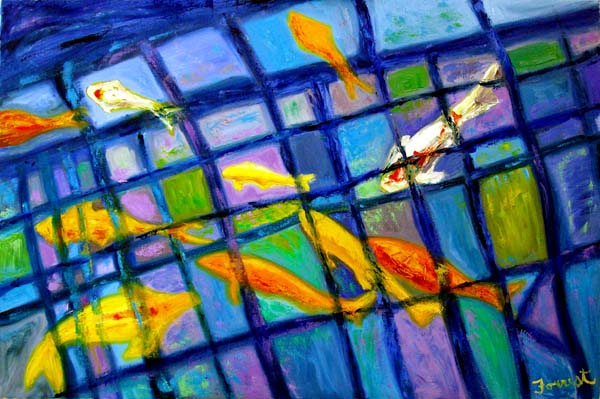
koi, painting by Brian Forrest
CloudsA. A. Garrison
“I was in the neighborhood,” Rachel said to herself, again, rehearsing. The building’s elevator was broken, and the stairs were long enough that she was beginning to sound believable.
|
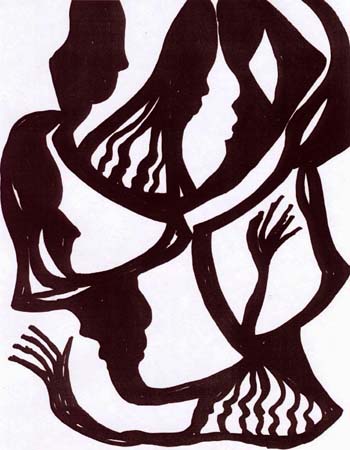
Reaching for Hope, art by Edward Michael O’Durr Supranowicz

Debra Purdy Kong, writer, British Columbia, Canada I like the magazine a lot. I like the spacious lay-out and the different coloured pages and the variety of writer’s styles. Too many literary magazines read as if everyone graduated from the same course. We need to collect more voices like these and send them everywhere.
Children, Churches and Daddies. It speaks for itself. Write to Scars Publications to submit poetry, prose and artwork to Children, Churches and Daddies literary magazine, or to inquire about having your own chapbook, and maybe a few reviews like these.
what is veganism? A vegan (VEE-gun) is someone who does not consume any animal products. While vegetarians avoid flesh foods, vegans don’t consume dairy or egg products, as well as animal products in clothing and other sources. why veganism? This cruelty-free lifestyle provides many benefits, to animals, the environment and to ourselves. The meat and dairy industry abuses billions of animals. Animal agriculture takes an enormous toll on the land. Consumtion of animal products has been linked to heart disease, colon and breast cancer, osteoporosis, diabetes and a host of other conditions. so what is vegan action?
We can succeed in shifting agriculture away from factory farming, saving millions, or even billions of chickens, cows, pigs, sheep turkeys and other animals from cruelty. A vegan, cruelty-free lifestyle may be the most important step a person can take towards creatin a more just and compassionate society. Contact us for membership information, t-shirt sales or donations.
vegan action
Children, Churches and Daddies no longer distributes free contributor’s copies of issues. In order to receive issues of Children, Churches and Daddies, contact Janet Kuypers at the cc&d e-mail addres. Free electronic subscriptions are available via email. All you need to do is email ccandd@scars.tv... and ask to be added to the free cc+d electronic subscription mailing list. And you can still see issues every month at the Children, Churches and Daddies website, located at http://scars.tv
MIT Vegetarian Support Group (VSG)
functions: We also have a discussion group for all issues related to vegetarianism, which currently has about 150 members, many of whom are outside the Boston area. The group is focusing more toward outreach and evolving from what it has been in years past. We welcome new members, as well as the opportunity to inform people about the benefits of vegetarianism, to our health, the environment, animal welfare, and a variety of other issues.
Dusty Dog Reviews: These poems document a very complicated internal response to the feminine side of social existence. And as the book proceeds the poems become increasingly psychologically complex and, ultimately, fascinating and genuinely rewarding.
Dusty Dog Reviews: She opens with a poem of her own devising, which has that wintry atmosphere demonstrated in the movie version of Boris Pasternak’s Doctor Zhivago. The atmosphere of wintry white and cold, gloriously murderous cold, stark raging cold, numbing and brutalizing cold, appears almost as a character who announces to his audience, “Wisdom occurs only after a laboriously magnificent disappointment.” Alas, that our Dusty Dog for mat cannot do justice to Ms. Kuypers’ very personal layering of her poem across the page.
Fithian Press, Santa Barbara, CA Indeed, there’s a healthy balance here between wit and dark vision, romance and reality, just as there’s a good balance between words and graphics. The work shows brave self-exploration, and serves as a reminder of mortality and the fragile beauty of friendship.
Mark Blickley, writer You Have to be Published to be Appreciated. Do you want to be heard? Contact Children, Churches and Daddies about book or chapbook publishing. These reviews can be yours. Scars Publications, attention J. Kuypers. We’re only an e-mail away. Write to us.
The Center for Renewable Energy and Sustainable Technology The Solar Energy Research & Education Foundation (SEREF), a non-profit organization based in Washington, D.C., established on Earth Day 1993 the Center for Renewable Energy and Sustainable Technology (CREST) as its central project. CREST’s three principal projects are to provide: * on-site training and education workshops on the sustainable development interconnections of energy, economics and environment; * on-line distance learning/training resources on CREST’s SOLSTICE computer, available from 144 countries through email and the Internet; * on-disc training and educational resources through the use of interactive multimedia applications on CD-ROM computer discs - showcasing current achievements and future opportunities in sustainable energy development. The CREST staff also does “on the road” presentations, demonstrations, and workshops showcasing its activities and available resources. For More Information Please Contact: Deborah Anderson dja@crest.org or (202) 289-0061
Dorrance Publishing Co., Pittsburgh, PA want a review like this? contact scars about getting your own book published.
 The magazine Children Churches and Daddies is Copyright © 1993 through 2012 Scars Publications and Design. The rights of the individual pieces remain with the authors. No material may be reprinted without express permission from the author. 
Okay, nilla wafer. Listen up and listen good. How to save your life. Submit, or I’ll have to kill you.
Dorrance Publishing Co., Pittsburgh, PA: “Hope Chest in the Attic” captures the complexity of human nature and reveals startling yet profound discernments about the travesties that surge through the course of life. This collection of poetry, prose and artwork reflects sensitivity toward feminist issues concerning abuse, sexism and equality. It also probes the emotional torrent that people may experience as a reaction to the delicate topics of death, love and family. “Chain Smoking” depicts the emotional distress that afflicted a friend while he struggled to clarify his sexual ambiguity. Not only does this thought-provoking profile address the plight that homosexuals face in a homophobic society, it also characterizes the essence of friendship. “The room of the rape” is a passionate representation of the suffering rape victims experience. Vivid descriptions, rich symbolism, and candid expressions paint a shocking portrait of victory over the gripping fear that consumes the soul after a painful exploitation.
Dusty Dog Reviews (on Without You): She open with a poem of her own devising, which has that wintry atmosphere demonstrated in the movie version of Boris Pasternak’s Doctor Zhivago. The atmosphere of wintry white and cold, gloriously murderous cold, stark raging cold, numbing and brutalizing cold, appears almost as a character who announces to his audience, “Wisdom occurs only after a laboriously magnificent disappointment.” Alas, that our Dusty Dog for mat cannot do justice to Ms. Kuypers’ very personal layering of her poem across the page.
|
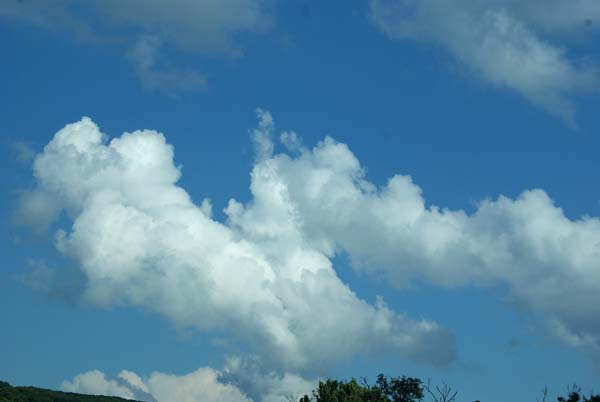 A couple of years passed and Johnny was now twelve. Other kids eventually moved into the neighborhood and at last he had several friends to play with. The lot had gone from his cloud shaping, napping refuge to a place where he and his friends would gather to play football games during football season and baseball games during baseball season. It was a good meeting place and was big enough for any sport they wanted to play. They were even known to play an intense game of kick the can on occasion. Every year on New Year’s Day all of his friends would gather at 1:00 o’clock and play a huge football game that they referred to as the toilet bowl. They looked forward to this every year and it continued all the way through High School. The teams consisted of different players every year but the names of the teams were always the same. It was The Wipples against the Tidy’s. The Wipples were named after the commercial where Mr. Wipple squeezed the Charmin, and the Tidy’s were named after the Tidy Bowl man.
A couple of years passed and Johnny was now twelve. Other kids eventually moved into the neighborhood and at last he had several friends to play with. The lot had gone from his cloud shaping, napping refuge to a place where he and his friends would gather to play football games during football season and baseball games during baseball season. It was a good meeting place and was big enough for any sport they wanted to play. They were even known to play an intense game of kick the can on occasion. Every year on New Year’s Day all of his friends would gather at 1:00 o’clock and play a huge football game that they referred to as the toilet bowl. They looked forward to this every year and it continued all the way through High School. The teams consisted of different players every year but the names of the teams were always the same. It was The Wipples against the Tidy’s. The Wipples were named after the commercial where Mr. Wipple squeezed the Charmin, and the Tidy’s were named after the Tidy Bowl man.